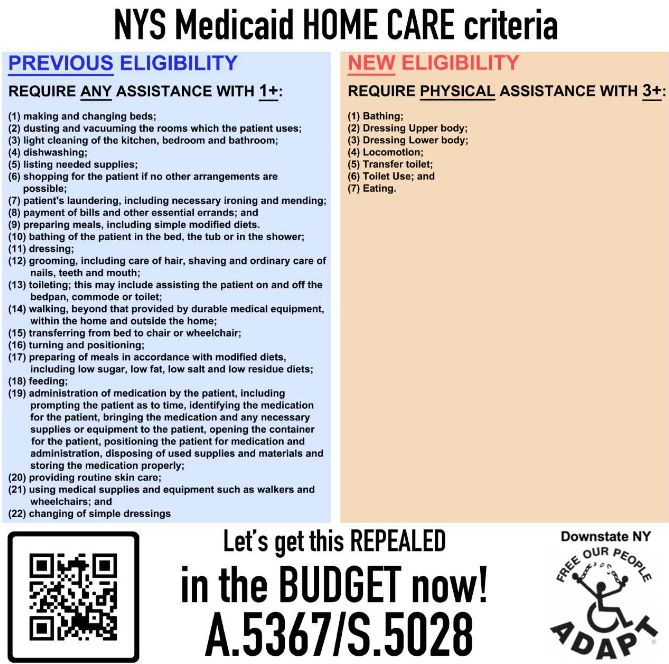Disabled people across the state are pleading with lawmakers to block cuts to New York's Medicaid program made under former Gov. Andrew Cuomo that will drastically narrow the criteria for Medicaid recipients who need home care.
State officials approved cuts to Medicaid in 2020 while looking to save money in the pandemic's early days.
Medicaid recipients in the state are currently eligible for basic personal assistance if their condition causes them to need help with basic cleaning, shopping, cooking, organizing and more.

A person used to need help with at least one of 22 actions to be eligible for home care or related assistance. That will be reduced down to three or more of seven things under cuts that have been frozen since the start of the COVID-19 pandemic.
"A lot of people are going to be forced into nursing homes," said Gina Barbara, a disabled advocate with the Restore Home Care Access Coalition. "It's going to strip rights and freedoms away from the disabled community and all we want to do is live in our homes and be successful in life."
The changes in eligibility are expected to take effect sometime next year. Representatives with Gov. Kathy Hochul's office met with advocates today and said there's time before these changes take effect.
Anita Cameron, of Rochester, is visually impaired, and has issues related to autism and diabetes.
The 57-year-old currently qualifies for home care under the state's Medicaid rules because she needs help with medications, house cleaning and bill payments, but would not qualify for one of the seven approved activities under the new law because she's mobile.
Advocates worry the changes will force more people into nursing homes or adult-care facilities.
"Although I have mobility issues, I can transfer, I can maneuver — I can turn myself over in bed," Cameron explained. "So under the proposed changes, I wouldn't even get attendant services. I wouldn't even be able to attempt to apply for services."
Cameron, who works as a disability rights activist at events across the state, says the cuts will likely result in her being sent to an adult-care facility when she spends time in the hospital for medical care throughout the year.
"I have a job part-time, but I have a job," Cameron added. "I wouldn't be able to work from a nursing home."
Brandon Heinrich, 31, from Long Island, mainly lives and works independently.
He's blind, but wouldn't qualify under the state Medicaid cuts if he needed assistance with simple tasks, which would force him to live in an institution.
"As a taxpayer, I don't believe that anybody should be denied any services, especially when this is supposed to save the state money," he said. "When you put a person into a nursing home, the average cost is way higher."
Advocates say there's at least 1,500 people on the state waiting list who need basic home care, or the lowest level of personal care assistance.
The state Office for the Aging did not respond to questions about the updated number of New Yorkers who need home care on a wait list, or the number of Medicaid recipients who would lose eligibility for care under the changes.
Sen. Gustavo Rivera sponsors legislation to prevent the changes to state Medicaid that would reduce eligibility and access to at-home services, and restore consumer-directed personal assistance (CDPA) to its pre-2020 form.
"The pandemic has increased the demand for home care services as seniors and differently-abled New Yorkers move away from receiving care in congregate settings, particularly at nursing homes," Rivera said in a statement Tuesday. "...Furthermore, repealing these proposed eligibility limitations, this proposal would allow New York to stay in compliance with federal requirements. Lastly, this proposal will allow more New Yorkers to stay home, which for most people is the safest, healthiest option while potentially saving millions to the state."
Rivera is pushing for preventing the cuts in the upcoming state budget that deadlines April 1. He is working to get more senators on his side to include the provision in the upper chamber's one-house budget proposal due next week.
"We were able to include the proposal in last year's one-house budget proposal, and I am optimistic we can do so again and put this issue to rest before these eligibility restrictions take effect," he said.
Meanwhile, representatives with Hochul's office cited at least a year before the changes taking effect. They told members of the coalition Tuesday they must compromise about the reductions in Medicaid eligibility for care, but encouraged them to focus on negotiating the cuts in next year's budget, or the 2024-25 spending plan.
But advocates maintain they are not open to compromise and any reduction in eligibility for home care is not an option. Nina Bakoyiannis, co-coordindator for Downstate New York Adapt, founding organization with the Home Care Access Coalition, says they need to hear more details from the governor's office about the need for cutting home care access for New Yorkers.
"We remain firm that there's no moral way to cut home care access regardless of how they spin it," Bakoyiannis said. "We want to work with them and hear what they have to say, but we remain firm that there's no compromise to home care access."
Members of the Home Care Access Coalition are expected to rally in the state Capitol next week.


